PPMP20009 - Project Management: Weekly Portfolio on Methodologies
VerifiedAdded on 2023/06/14
|5
|1373
|461
Portfolio
AI Summary
This project portfolio provides an overview of project management methodologies, drawing from lecture slides, recommended readings, and personal experiences. It covers the evolution of project management, key concepts, and the benefits of different methodologies. The portfolio includes analysis of project lifecycles, change management, and the importance of aligning project practices with organizational strategy. It also reflects on past project failures and lessons learned, emphasizing the significance of resource management and continuous improvement. Methodologies such as the waterfall model are discussed, along with the role of project managers and team dynamics. The document concludes with a bibliography of relevant sources, providing a comprehensive review of project management principles and practices. Desklib offers more resources for students.
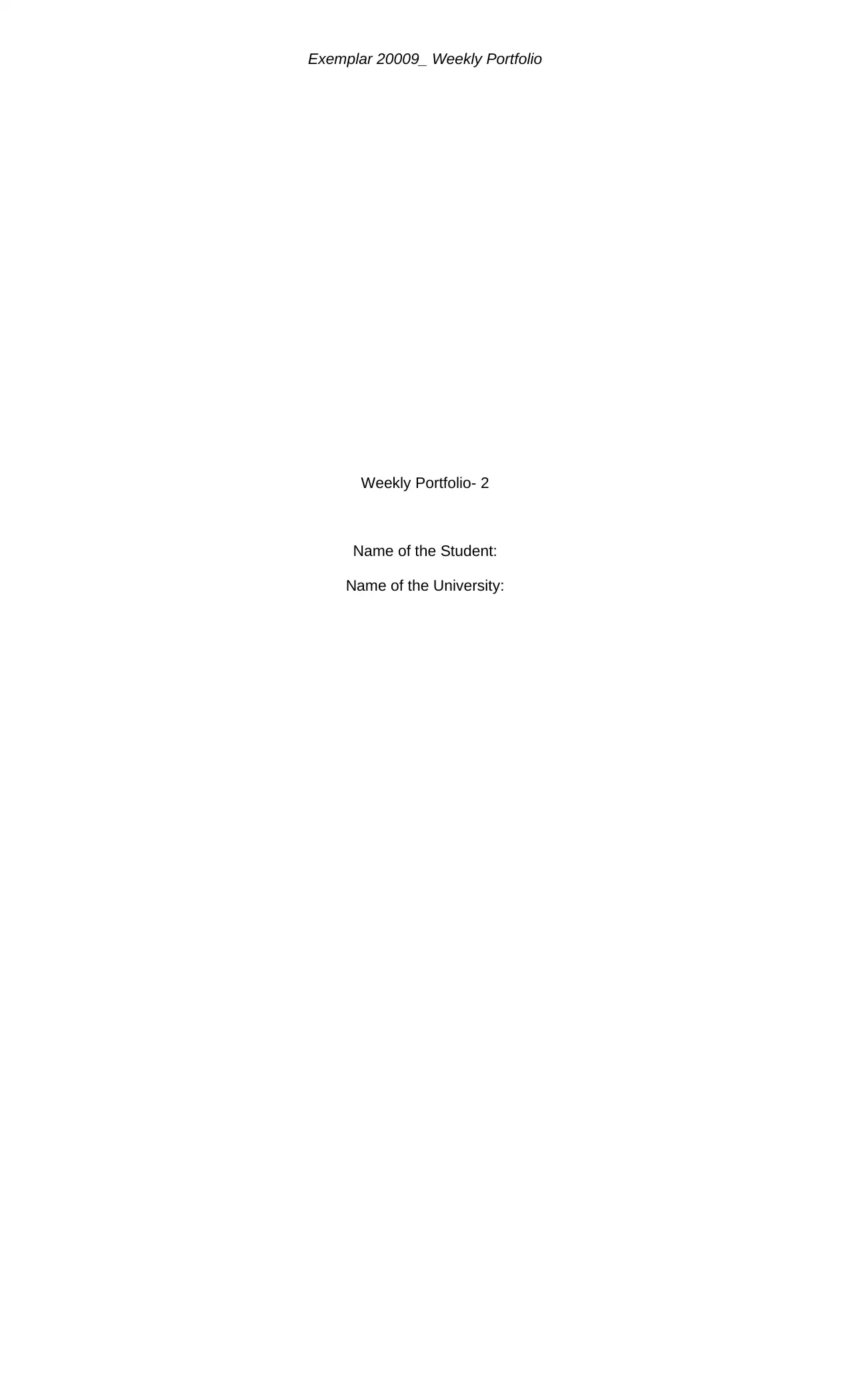
Exemplar 20009_ Weekly Portfolio
Weekly Portfolio- 2
Name of the Student:
Name of the University:
Weekly Portfolio- 2
Name of the Student:
Name of the University:
Paraphrase This Document
Need a fresh take? Get an instant paraphrase of this document with our AI Paraphraser
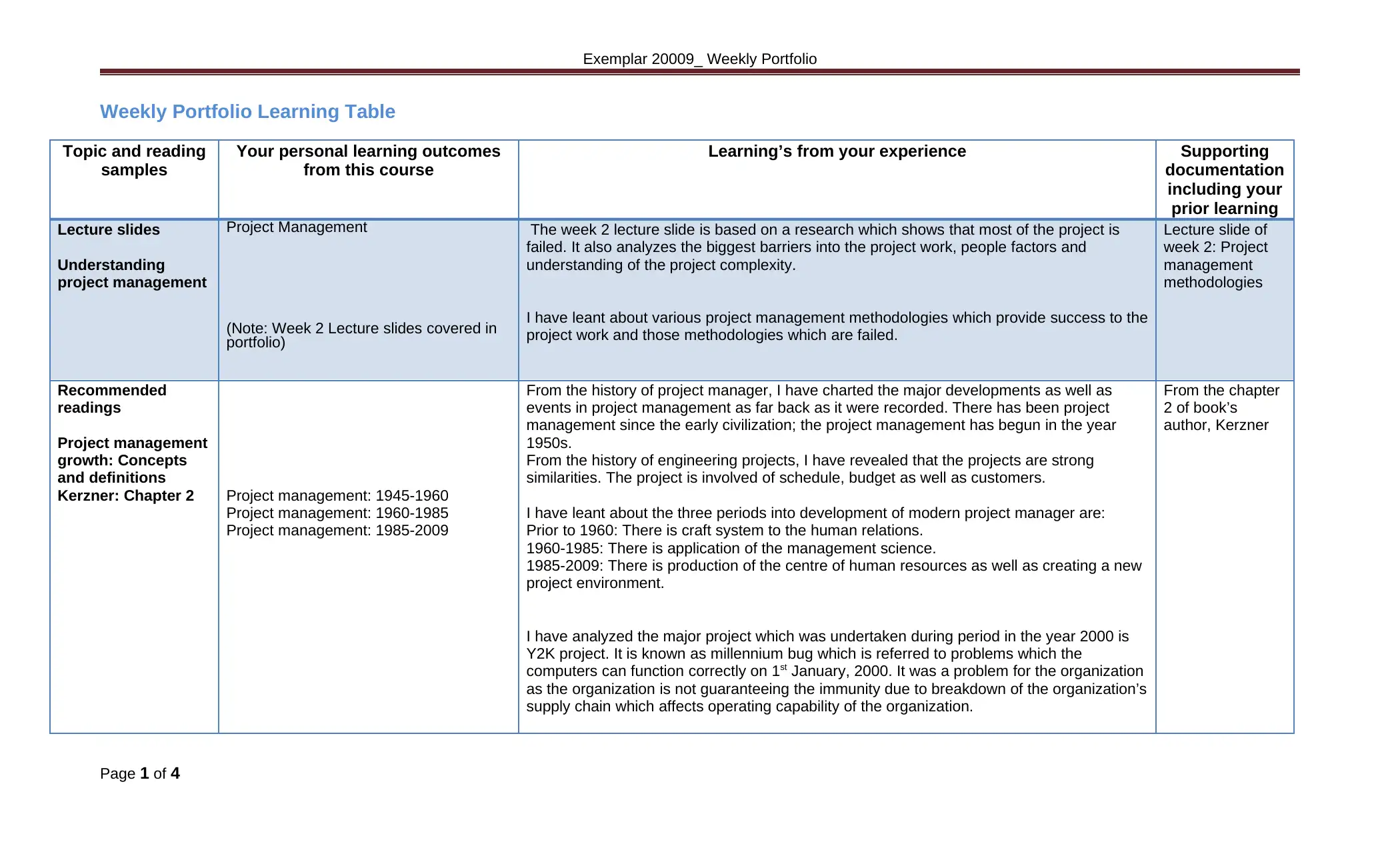
Exemplar 20009_ Weekly Portfolio
Weekly Portfolio Learning Table
Topic and reading
samples
Your personal learning outcomes
from this course
Learning’s from your experience Supporting
documentation
including your
prior learning
Lecture slides
Understanding
project management
Project Management
(Note: Week 2 Lecture slides covered in
portfolio)
The week 2 lecture slide is based on a research which shows that most of the project is
failed. It also analyzes the biggest barriers into the project work, people factors and
understanding of the project complexity.
I have leant about various project management methodologies which provide success to the
project work and those methodologies which are failed.
Lecture slide of
week 2: Project
management
methodologies
Recommended
readings
Project management
growth: Concepts
and definitions
Kerzner: Chapter 2 Project management: 1945-1960
Project management: 1960-1985
Project management: 1985-2009
From the history of project manager, I have charted the major developments as well as
events in project management as far back as it were recorded. There has been project
management since the early civilization; the project management has begun in the year
1950s.
From the history of engineering projects, I have revealed that the projects are strong
similarities. The project is involved of schedule, budget as well as customers.
I have leant about the three periods into development of modern project manager are:
Prior to 1960: There is craft system to the human relations.
1960-1985: There is application of the management science.
1985-2009: There is production of the centre of human resources as well as creating a new
project environment.
I have analyzed the major project which was undertaken during period in the year 2000 is
Y2K project. It is known as millennium bug which is referred to problems which the
computers can function correctly on 1st January, 2000. It was a problem for the organization
as the organization is not guaranteeing the immunity due to breakdown of the organization’s
supply chain which affects operating capability of the organization.
From the chapter
2 of book’s
author, Kerzner
Page 1 of 4
Weekly Portfolio Learning Table
Topic and reading
samples
Your personal learning outcomes
from this course
Learning’s from your experience Supporting
documentation
including your
prior learning
Lecture slides
Understanding
project management
Project Management
(Note: Week 2 Lecture slides covered in
portfolio)
The week 2 lecture slide is based on a research which shows that most of the project is
failed. It also analyzes the biggest barriers into the project work, people factors and
understanding of the project complexity.
I have leant about various project management methodologies which provide success to the
project work and those methodologies which are failed.
Lecture slide of
week 2: Project
management
methodologies
Recommended
readings
Project management
growth: Concepts
and definitions
Kerzner: Chapter 2 Project management: 1945-1960
Project management: 1960-1985
Project management: 1985-2009
From the history of project manager, I have charted the major developments as well as
events in project management as far back as it were recorded. There has been project
management since the early civilization; the project management has begun in the year
1950s.
From the history of engineering projects, I have revealed that the projects are strong
similarities. The project is involved of schedule, budget as well as customers.
I have leant about the three periods into development of modern project manager are:
Prior to 1960: There is craft system to the human relations.
1960-1985: There is application of the management science.
1985-2009: There is production of the centre of human resources as well as creating a new
project environment.
I have analyzed the major project which was undertaken during period in the year 2000 is
Y2K project. It is known as millennium bug which is referred to problems which the
computers can function correctly on 1st January, 2000. It was a problem for the organization
as the organization is not guaranteeing the immunity due to breakdown of the organization’s
supply chain which affects operating capability of the organization.
From the chapter
2 of book’s
author, Kerzner
Page 1 of 4
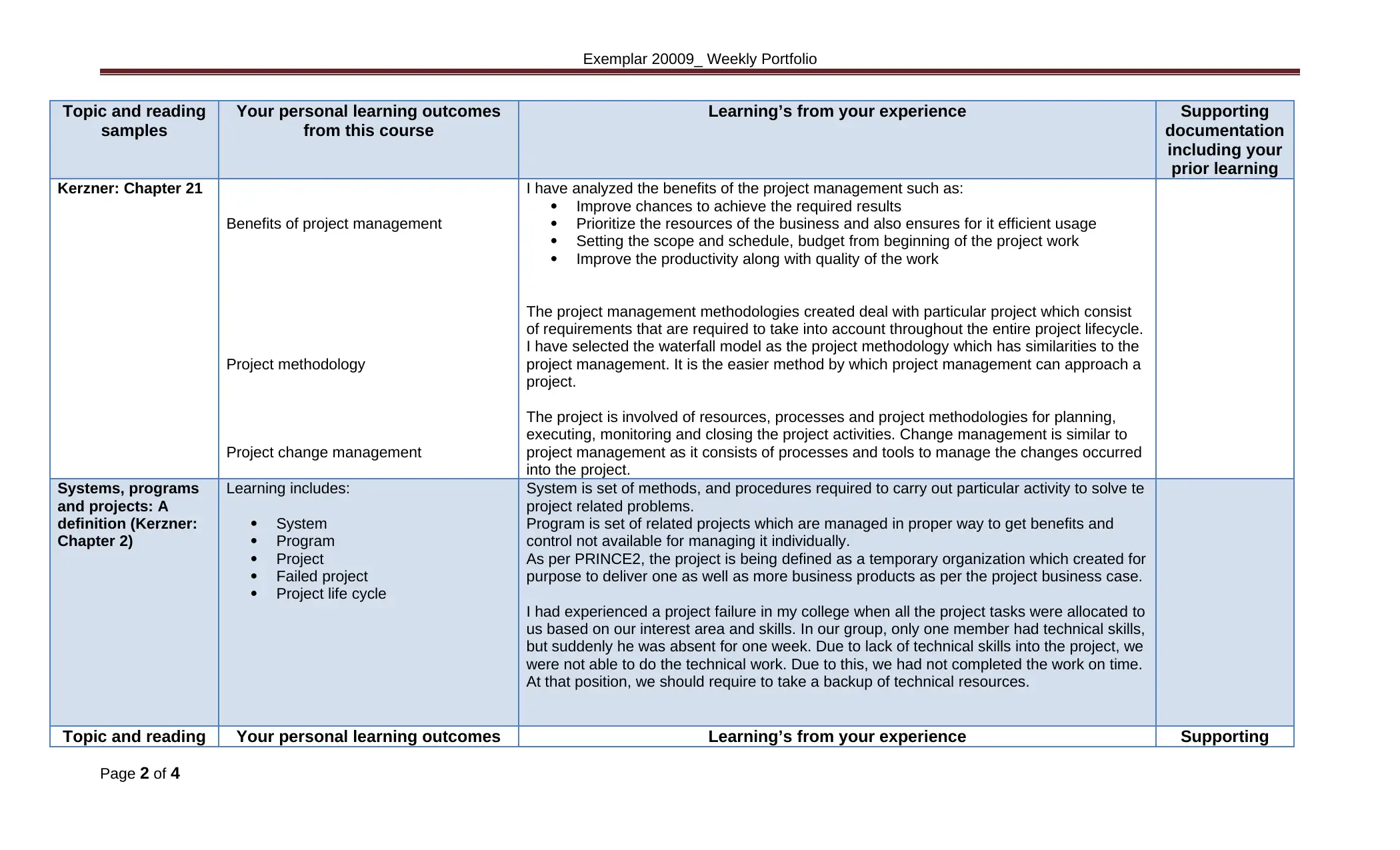
Exemplar 20009_ Weekly Portfolio
Topic and reading
samples
Your personal learning outcomes
from this course
Learning’s from your experience Supporting
documentation
including your
prior learning
Kerzner: Chapter 21
Benefits of project management
Project methodology
Project change management
I have analyzed the benefits of the project management such as:
Improve chances to achieve the required results
Prioritize the resources of the business and also ensures for it efficient usage
Setting the scope and schedule, budget from beginning of the project work
Improve the productivity along with quality of the work
The project management methodologies created deal with particular project which consist
of requirements that are required to take into account throughout the entire project lifecycle.
I have selected the waterfall model as the project methodology which has similarities to the
project management. It is the easier method by which project management can approach a
project.
The project is involved of resources, processes and project methodologies for planning,
executing, monitoring and closing the project activities. Change management is similar to
project management as it consists of processes and tools to manage the changes occurred
into the project.
Systems, programs
and projects: A
definition (Kerzner:
Chapter 2)
Learning includes:
System
Program
Project
Failed project
Project life cycle
System is set of methods, and procedures required to carry out particular activity to solve te
project related problems.
Program is set of related projects which are managed in proper way to get benefits and
control not available for managing it individually.
As per PRINCE2, the project is being defined as a temporary organization which created for
purpose to deliver one as well as more business products as per the project business case.
I had experienced a project failure in my college when all the project tasks were allocated to
us based on our interest area and skills. In our group, only one member had technical skills,
but suddenly he was absent for one week. Due to lack of technical skills into the project, we
were not able to do the technical work. Due to this, we had not completed the work on time.
At that position, we should require to take a backup of technical resources.
Topic and reading Your personal learning outcomes Learning’s from your experience Supporting
Page 2 of 4
Topic and reading
samples
Your personal learning outcomes
from this course
Learning’s from your experience Supporting
documentation
including your
prior learning
Kerzner: Chapter 21
Benefits of project management
Project methodology
Project change management
I have analyzed the benefits of the project management such as:
Improve chances to achieve the required results
Prioritize the resources of the business and also ensures for it efficient usage
Setting the scope and schedule, budget from beginning of the project work
Improve the productivity along with quality of the work
The project management methodologies created deal with particular project which consist
of requirements that are required to take into account throughout the entire project lifecycle.
I have selected the waterfall model as the project methodology which has similarities to the
project management. It is the easier method by which project management can approach a
project.
The project is involved of resources, processes and project methodologies for planning,
executing, monitoring and closing the project activities. Change management is similar to
project management as it consists of processes and tools to manage the changes occurred
into the project.
Systems, programs
and projects: A
definition (Kerzner:
Chapter 2)
Learning includes:
System
Program
Project
Failed project
Project life cycle
System is set of methods, and procedures required to carry out particular activity to solve te
project related problems.
Program is set of related projects which are managed in proper way to get benefits and
control not available for managing it individually.
As per PRINCE2, the project is being defined as a temporary organization which created for
purpose to deliver one as well as more business products as per the project business case.
I had experienced a project failure in my college when all the project tasks were allocated to
us based on our interest area and skills. In our group, only one member had technical skills,
but suddenly he was absent for one week. Due to lack of technical skills into the project, we
were not able to do the technical work. Due to this, we had not completed the work on time.
At that position, we should require to take a backup of technical resources.
Topic and reading Your personal learning outcomes Learning’s from your experience Supporting
Page 2 of 4
⊘ This is a preview!⊘
Do you want full access?
Subscribe today to unlock all pages.

Trusted by 1+ million students worldwide
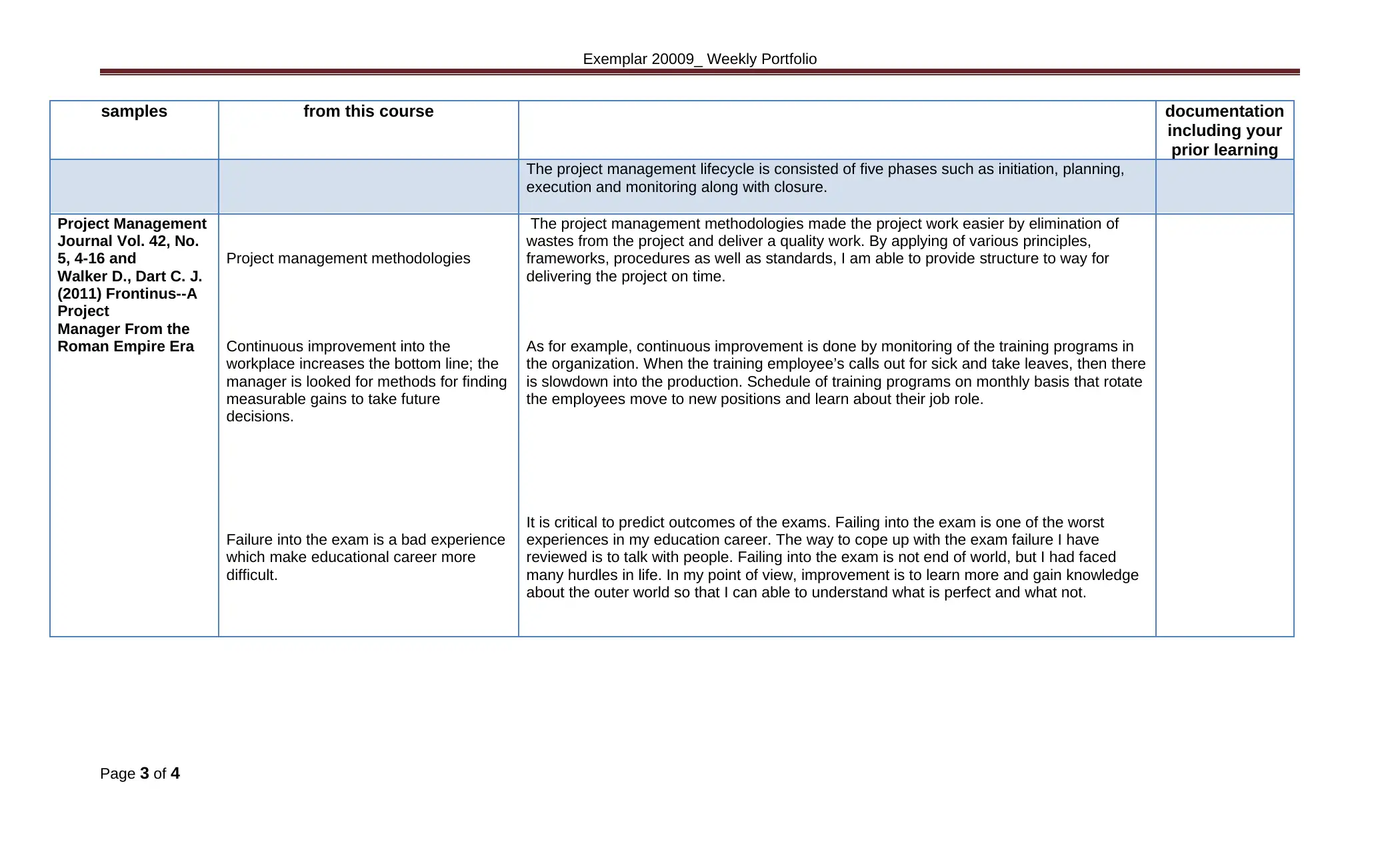
Exemplar 20009_ Weekly Portfolio
samples from this course documentation
including your
prior learning
The project management lifecycle is consisted of five phases such as initiation, planning,
execution and monitoring along with closure.
Project Management
Journal Vol. 42, No.
5, 4-16 and
Walker D., Dart C. J.
(2011) Frontinus--A
Project
Manager From the
Roman Empire Era
Project management methodologies
Continuous improvement into the
workplace increases the bottom line; the
manager is looked for methods for finding
measurable gains to take future
decisions.
Failure into the exam is a bad experience
which make educational career more
difficult.
The project management methodologies made the project work easier by elimination of
wastes from the project and deliver a quality work. By applying of various principles,
frameworks, procedures as well as standards, I am able to provide structure to way for
delivering the project on time.
As for example, continuous improvement is done by monitoring of the training programs in
the organization. When the training employee’s calls out for sick and take leaves, then there
is slowdown into the production. Schedule of training programs on monthly basis that rotate
the employees move to new positions and learn about their job role.
It is critical to predict outcomes of the exams. Failing into the exam is one of the worst
experiences in my education career. The way to cope up with the exam failure I have
reviewed is to talk with people. Failing into the exam is not end of world, but I had faced
many hurdles in life. In my point of view, improvement is to learn more and gain knowledge
about the outer world so that I can able to understand what is perfect and what not.
Page 3 of 4
samples from this course documentation
including your
prior learning
The project management lifecycle is consisted of five phases such as initiation, planning,
execution and monitoring along with closure.
Project Management
Journal Vol. 42, No.
5, 4-16 and
Walker D., Dart C. J.
(2011) Frontinus--A
Project
Manager From the
Roman Empire Era
Project management methodologies
Continuous improvement into the
workplace increases the bottom line; the
manager is looked for methods for finding
measurable gains to take future
decisions.
Failure into the exam is a bad experience
which make educational career more
difficult.
The project management methodologies made the project work easier by elimination of
wastes from the project and deliver a quality work. By applying of various principles,
frameworks, procedures as well as standards, I am able to provide structure to way for
delivering the project on time.
As for example, continuous improvement is done by monitoring of the training programs in
the organization. When the training employee’s calls out for sick and take leaves, then there
is slowdown into the production. Schedule of training programs on monthly basis that rotate
the employees move to new positions and learn about their job role.
It is critical to predict outcomes of the exams. Failing into the exam is one of the worst
experiences in my education career. The way to cope up with the exam failure I have
reviewed is to talk with people. Failing into the exam is not end of world, but I had faced
many hurdles in life. In my point of view, improvement is to learn more and gain knowledge
about the outer world so that I can able to understand what is perfect and what not.
Page 3 of 4
Paraphrase This Document
Need a fresh take? Get an instant paraphrase of this document with our AI Paraphraser
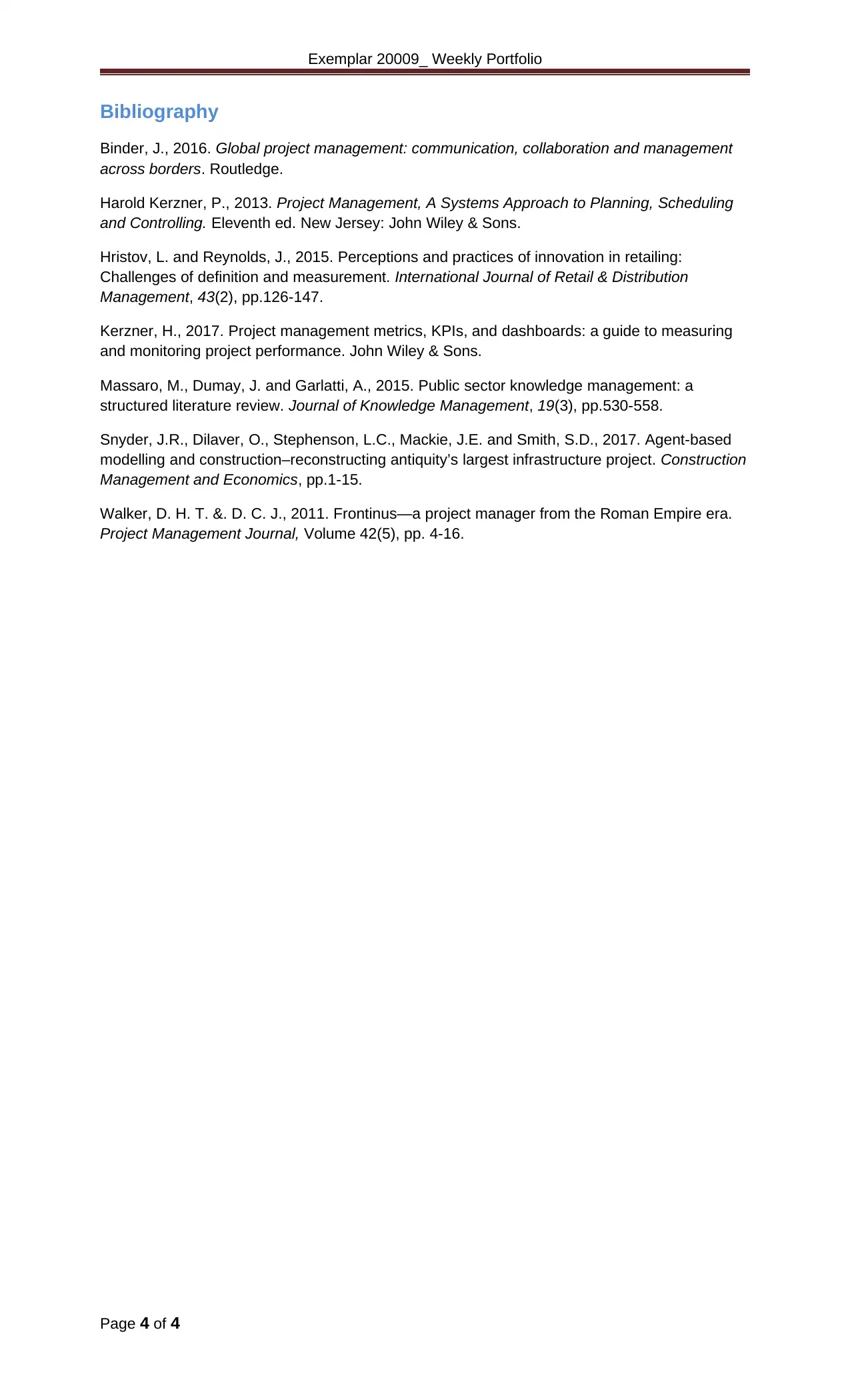
Exemplar 20009_ Weekly Portfolio
Bibliography
Binder, J., 2016. Global project management: communication, collaboration and management
across borders. Routledge.
Harold Kerzner, P., 2013. Project Management, A Systems Approach to Planning, Scheduling
and Controlling. Eleventh ed. New Jersey: John Wiley & Sons.
Hristov, L. and Reynolds, J., 2015. Perceptions and practices of innovation in retailing:
Challenges of definition and measurement. International Journal of Retail & Distribution
Management, 43(2), pp.126-147.
Kerzner, H., 2017. Project management metrics, KPIs, and dashboards: a guide to measuring
and monitoring project performance. John Wiley & Sons.
Massaro, M., Dumay, J. and Garlatti, A., 2015. Public sector knowledge management: a
structured literature review. Journal of Knowledge Management, 19(3), pp.530-558.
Snyder, J.R., Dilaver, O., Stephenson, L.C., Mackie, J.E. and Smith, S.D., 2017. Agent-based
modelling and construction–reconstructing antiquity’s largest infrastructure project. Construction
Management and Economics, pp.1-15.
Walker, D. H. T. &. D. C. J., 2011. Frontinus—a project manager from the Roman Empire era.
Project Management Journal, Volume 42(5), pp. 4-16.
Page 4 of 4
Bibliography
Binder, J., 2016. Global project management: communication, collaboration and management
across borders. Routledge.
Harold Kerzner, P., 2013. Project Management, A Systems Approach to Planning, Scheduling
and Controlling. Eleventh ed. New Jersey: John Wiley & Sons.
Hristov, L. and Reynolds, J., 2015. Perceptions and practices of innovation in retailing:
Challenges of definition and measurement. International Journal of Retail & Distribution
Management, 43(2), pp.126-147.
Kerzner, H., 2017. Project management metrics, KPIs, and dashboards: a guide to measuring
and monitoring project performance. John Wiley & Sons.
Massaro, M., Dumay, J. and Garlatti, A., 2015. Public sector knowledge management: a
structured literature review. Journal of Knowledge Management, 19(3), pp.530-558.
Snyder, J.R., Dilaver, O., Stephenson, L.C., Mackie, J.E. and Smith, S.D., 2017. Agent-based
modelling and construction–reconstructing antiquity’s largest infrastructure project. Construction
Management and Economics, pp.1-15.
Walker, D. H. T. &. D. C. J., 2011. Frontinus—a project manager from the Roman Empire era.
Project Management Journal, Volume 42(5), pp. 4-16.
Page 4 of 4
1 out of 5
Related Documents
Your All-in-One AI-Powered Toolkit for Academic Success.
+13062052269
info@desklib.com
Available 24*7 on WhatsApp / Email
![[object Object]](/_next/static/media/star-bottom.7253800d.svg)
Unlock your academic potential
Copyright © 2020–2026 A2Z Services. All Rights Reserved. Developed and managed by ZUCOL.



